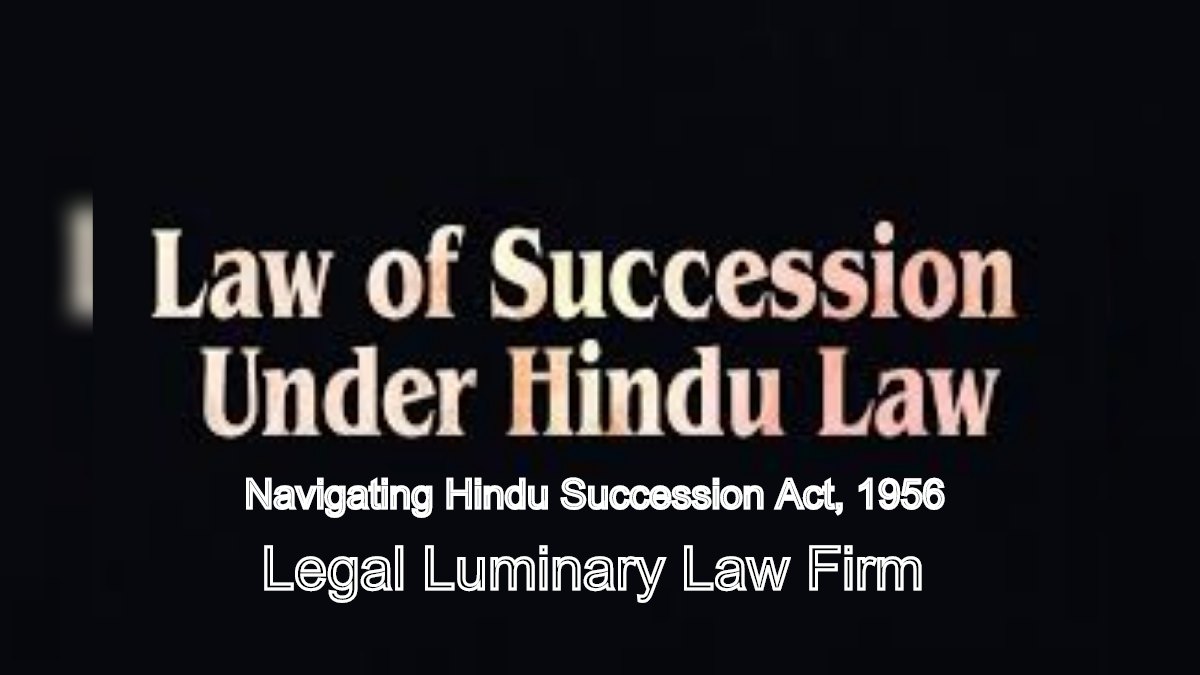Family Matters Resolved: Navigating Hindu Succession Act, 1956
Navigating Hindu Succession Act: Family is the cornerstone of Indian society. However, navigating inheritance rights and property distribution within a family can be a complex process, particularly when governed by the Hindu Succession Act, 1956 (HSA). The legalities surrounding inheritance can be confusing, leading to uncertainty and potential conflict. Here, the Legal Luminary Law Firm steps in, offering clarity and exceptional legal guidance to ensure a smooth and amicable resolution of family inheritance matters.
Demystifying Inheritance in India: The Hindu Succession Act and Your Legal Options – Legal Luminary Law Firm
Understanding the Hindu Succession Act, 1956:
The Hindu Succession Act, 1956, is a landmark piece of legislation governing inheritance rights for Hindus, Buddhists, Jains, and Sikhs in India. This Act outlines the legal framework for distributing the property of a deceased person (known as the “intestate”) amongst their legal heirs. Understanding the key provisions of the HSA is crucial for navigating inheritance within a Hindu family.
The Legal Luminary Law Firm: Expert Guidance Through Every Step:
The Legal Luminary Law Firm boasts a team of highly qualified and experienced lawyers specializing in inheritance law. They possess a deep understanding of the Hindu Succession Act and its intricacies. This expertise translates into exceptional legal services designed to:
- Clearly explain the provisions of the HSA as they apply to your specific situation.
- Identify your legal rights and entitlements as an heir under the Act.
- Assist you in interpreting a will, if one exists, and ensuring its validity.
- Navigate complex legalities surrounding ancestral property and coparcenary rights.
- Facilitate amicable and fair distribution of property amongst legal heirs.
- Represent you effectively in court if inheritance disputes arise.
Benefits of Seeking Legal Guidance for Inheritance Matters:
While the Hindu Succession Act provides a framework for inheritance, navigating its complexities without legal expertise can be challenging. Partnering with the Legal Luminary Law Firm offers several advantages:
- Avoiding Disputes: Their lawyers can anticipate potential issues and guide you towards solutions that minimize conflict amongst family members.
- Ensuring Fair Distribution: They will meticulously analyze the legalities of your situation and ensure all legal heirs receive their rightful share of the inheritance.
- Understanding Complexities: The Act can be intricate, especially concerning ancestral property and coparcenary rights. Their lawyers will provide clear explanations and ensure you understand your rights and options.
- Wills and Probate: If a will exists, they will verify its validity and ensure its proper execution during probate proceedings.
- Legal Representation in Court: In case of inheritance disputes, their experienced lawyers will represent you confidently in court, protecting your legal interests.
The Legal Luminary Law Firm: Committed to Client Satisfaction:
The Legal Luminary Law Firm understands the emotional complexities involved in family inheritance matters. They prioritize client satisfaction by:
- Maintaining open communication and keeping you informed throughout the process.
- Addressing your questions and concerns promptly and comprehensively.
- Treating you with respect and compassion while navigating sensitive family situations.
- Working diligently to achieve a fair and amicable resolution for all parties involved.
Frequently Asked Questions (FAQs):
The Hindu Succession Act, 1956, governs inheritance rights for Hindus, Buddhists, Jains, and Sikhs in India. It outlines the legal framework for distributing the property of a deceased person amongst their legal heirs.
The Act defines legal heirs based on the relationship with the deceased. These can include spouses, children (including daughters), parents, grandchildren, and in some cases, even siblings and nephews/nieces.
While not mandatory, seeking legal guidance from a lawyer specializing in inheritance law is highly recommended. Their expertise can ensure a smooth and fair distribution process, minimizing potential conflicts.
If a will exists, it takes precedence over the Hindu Succession Act. However, the validity of the will needs to be established, and the Legal Luminary Law Firm can assist you with this process.
In case of disagreements regarding inheritance, it’s crucial to seek legal representation. The Legal Luminary Law Firm can guide you towards alternative dispute resolution mechanisms or represent you effectively in court.
Conclusion:
Inheritance matters within a family can be delicate and emotionally charged. However, with the guidance of the Legal Luminary Law Firm, you can navigate the legalities of the Hindu Succession Act with confidence. Through their expertise, clear communication, and commitment to client satisfaction, they can ensure a fair and amicable resolution for all parties involved, allowing you to focus on cherishing the deal.
Read More
- Ensuring Authenticity: Navigating the Registration Act, 1908
- Unraveling Legal Evidence: Understanding the Indian Evidence Act, 1872
- Property Transactions Simplified: Exploring the Transfer of Property Act, 1882
- Criminal Justice Unveiled: Navigating the Code of Criminal Procedure (CrPC), 1973
- Timing Matters: Insights into the Limitation Act, 1963
- Department of Legal Affairs (DoLA):

